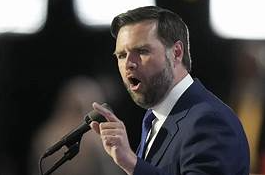Donald Trump’s running mate has brought the new right to the brink of power.
In June 2016, JD Vance published his memoir Hillbilly Elegy, which catapulted him to national prominence as the voice of America’s white working class. Raised in Middletown, Ohio, a city devastated by the decline of manufacturing, Vance became an unlikely cultural critic. His book examined the struggles of left-behind communities in the rust belt and sought to explain why Donald Trump had found such a strong following among these disenfranchised voters. At the time, Vance’s critiques of Trump were harsh, calling him “cultural heroin” and even suggesting that the presidential candidate might be “America’s Hitler.” He famously positioned himself as a “never Trump guy,” distancing himself from the rising political force.
Vance’s early criticisms of Trump aligned him with many liberals who feared the impact of Trump’s populist rhetoric. His analysis of America’s rural working class was welcomed by some on the left, but his political trajectory has dramatically changed since then. Fast forward to the present, and Vance has evolved from critic to staunch ally of the former president. He is now serving as the Republican senator for Ohio, having fully embraced Trump’s agenda. Today, Vance calls Trump “America’s last best hope,” a complete reversal of his prior opposition to the former president.
This sudden transformation has prompted many to question Vance’s motives and political convictions. The simplest explanation for his change in stance is that he is willing to say anything to secure political advancement. It is not uncommon for politicians to shift their positions in response to changing political tides, especially when a powerful figure like Trump dominates the Republican Party. However, there is also a more unsettling possibility: that Vance’s change of heart is genuine and reflects a shift in his own beliefs. His newfound support for Trump may not be just political expediency, but a realignment with the values and ideas that have come to define the new right.
Vance’s rhetoric has become more extreme in recent years, further signaling his embrace of Trumpism. He has made inflammatory comments about “childless cat ladies” and suggested that people with children should have more political influence, framing these remarks as a critique of the cultural elite. His attacks on abortion and his embrace of conservative populism suggest that he is not merely playing to the base but is actually positioning himself as a leader within it. His views are in line with the more radical elements of the Republican Party, which have gained traction under Trump’s influence.
This ideological shift raises important questions about Vance’s political future. If he truly believes in the principles he now espouses, what would his policies look like? As a rising star in the Republican Party, Vance has the potential to shape the future of American politics. His alignment with the far-right agenda could have far-reaching implications for issues like immigration, healthcare, and social welfare. If Vance becomes a key player in the national political landscape, his influence could accelerate the further radicalization of the Republican Party.
Vance’s transformation is also indicative of a larger trend within the Republican Party. The rise of Trump has led to a growing movement of politicians who reject the traditional conservative establishment in favor of a more populist, nationalist agenda. Figures like Vance, who once represented a more moderate or even liberal viewpoint, are now fully embracing Trump’s vision for the country. This shift highlights the increasing polarization in American politics, as more centrist voices are sidelined in favor of those who can appeal to the populist base.
Ultimately, Vance’s political journey raises profound questions about the direction of American politics. His transformation from a critic of Trump to one of his most ardent supporters reflects a broader shift in the Republican Party and American conservatism. Whether this shift is temporary or permanent will depend on the direction of the 2024 election and the future of the GOP. For now, Vance stands at the forefront of a political movement that is reshaping the nation’s political landscape. His next steps will determine whether he is a mere opportunist or a true believer in the new right.

